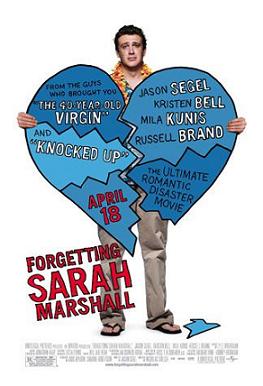2008
6.5

The break up film is a weapon of mass confusion and illusion in America. The very words conjure up images of lone men sprinting through airports, heart broken singles in sappy song montages, and, for some reason, the Seattle Space Needle. The whole purpose of the genre, tied inexorably to the romantic comedy, is the affirmation of love and life and that both go on in the wake of personal upheaval. It is supposed to get the viewer slightly emotional and relatively connected to the plight of its characters. It is supposed to relieve that viewer of any and all anxieties about severed romance, nomadic loneliness, and all other banal abstractions somehow related to losing some kind of a connection. What break up films do instead is instill a false confidence about the irrefutable obviousness of the now-ex-lover's stable mental health. In Layman's terms they suggest that we are too stupid to be sad. Everything is going to be fine because we're not even thinking of the alternative: that everything will NOT be fine. That the world is going to fucking end. That we will never love again.
Recuperating from a bad break-up (in which you, the reader, are the victim) is like recuperating from a bad break up movie. At first you feel OK because you want to feel OK. Then you reflect. After feeling OK for a little while you over compensate by being hugely critical. You assume everything was a waste of time. You are remorselessly cruel to yourself for even participating in the travesty. However, after enough time goes by you can put everything into proper perspective. You can calmly evaluate the pros and cons. You kinda realize that you were cheated by falsity, but that harshness would have really hurt your feelings. You go back and see how things could have been a little more balanced and a little more real. Forgetting Sarah Marshall is not your typical break up movie, although it is mostly about a typical break up, only on a much larger scale. Though Appatowian (official terminology) in its realism, the film is restless without the crutch of the standard romantic comedy structure. Full of modest laughs and efficient dialog the film ends up hobbling around for 90 minutes before deciding to sit down, get some work done, and get over itself.
So all that was pretty meta. The break up film as break up; the film as protagonist; its self realized nature. It's a mind fuck when you really think about it. But that's what films associated with producer/director/writer/cult god Judd Appatow are like. They are intensely self-reflective, unsure of themselves and geeky as fuck, kind of like Appatow and most of his buddies. They take the tried and true genres we're familiar with and give them a truly enlightening sense of earnestness and familiarity. Appatow's most effective weapon, besides his humor, is his disarming sense of honesty. I don't need to remind you that Appatow, in one way or another, has been a part of the best film comedies of the last five years. Appatow's influence on a film isn't always so much seen as it is felt. In Forgetting Sarah Marshall, Appatow is not the director nor a writer, yet you can feel his aged wisdom in lead actor Jason Segel's script. You can also see it in his performance. Segel plays Peter Bretter, a gawky guy trying to be funny, failing a lot of the time, disconnected and basically waiting to have his life ruptured in some way. Of course, that happens when long time girlfriend Sarah Marshall (Kristin Bell) breaks up with him for “tragically hip” rock star Aldous Snow (Russell Brand). Then Peter accidentally follows the new couple to Hawaii. He attempts to sabotage their rendezvous but ends up upsetting himself to greater and greater extents until he meets and falls for hotel receptionist Rachel (That 70s Show's Mila Kunis).
Given all that, what's most disappointing about this movie is also what's most obvious: the absence of a noteworthy climax. Is it when Peter rides his surfboard into Aldous after finding out how long his ex-girlfriend's affair had been going on? Or is it when he propels himself off the side of a cliff into the crystal clear Pacific? Is it when Sarah and Peter attempt to have post-break up sex only to find that Peter's penis is too near the heart that Sarah smashed into a million pieces to have effective consensual intercourse? It is pretty unclear. What's clear is that toward the end of the film things go down hill cinematically while conversely becoming cliché and uplifting. The film submits to it's own disingenuous desire to fit a pattern, to pull the wool back over our collective eyes. After opening the viewer's mind to the myriad ways in which reasonable, sane and otherwise average people react to being broken up with, it turns around and insists that even if you're writing a rock opera about Dracula which incorporates lots of streamers and puppets, the hot girl you met in Hawaii will totally come to see it and realize she wants to be with you. Oh, and she will see you naked. Synopsis: Forgetting Sarah Marshall. Funny? Yes. Disappointing? Indeed. Broke my heart? Well, let's just say I'm just getting off the couch.
No comments:
Post a Comment